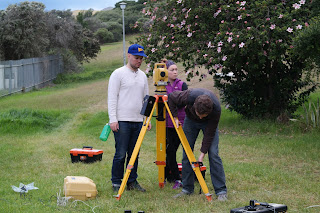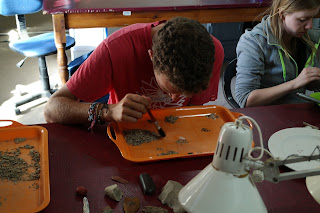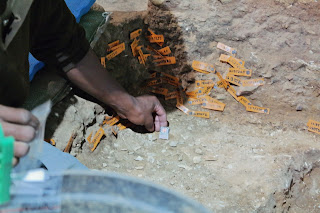Well, I was going to talk about the second half of my time
in Cape Town, but the truth is that there is so much to talk about in Mossel
Bay that if I don’t catch up now I never will. Suffice to say, I met up with my
classmates, professor, and her husband at the airport. We all stayed in a
lovely beach house, visited an organic farm, and went shopping at an open-air
market.
On Sunday, we then drove 4 ½ hours through agricultural land
west to Mossel Bay. We checked into the hostel that will be our home for the
next six weeks, and then drove to the Mossel Bay Museum, where the archaeology
lab is located and where everyone else had already started training. The view
from the lab looks like this:
What we found were a bunch of people on the front lawn
learning how to operate a total station. What is a total station, you may ask?
Well, they’re these thingies:
I’m sure you’ve seen them on the side of the road. They are
used for surveying. The idea behind them is that they use what are called
control points, which are set points for which the machine knows the exact
location in space, to find the stations’ exact point in space. It then uses
lasers to take a reading of where every artifact is found and creates a 3D map
of a site and its artifacts to analyze. They are very expensive, very
sensitive, and use brand new software no one is quite familiar with yet. We
trained on them for the rest of the day and the first part of the next day,
learning how to set them up, take them down, and configure them.
Then it was on to learning to sort. Providing us with examples,
they gave each of us a tray and dumped a bunch of rubble into it. Then they
asked us to pick out the things that were archaeologically significant (i.e.
shell, bone, lithics, and the like). This was surprisingly difficult, and
everyone struggled through it a little.
Then we just screwed around with Jamie’s, my professor’s,
reference collection of bones.
There are actually two sites we are excavating this season. The first one is called PP 5/6. It's a rock shelter that dates back about 90,000
years up to about 50,000 years. It has been intensively occupied by Homo sapiens for much of that time and there are a lot of artifacts to be found. The second is an open-air site,
basically a beach, called Vleesbaai. This is a site that has never been
excavated before, but heavy rains and erosion have brought, what I’m told, is
any insane amount of lithics to the surface.
There are two main jobs you can do at these sites in field
school, and we rotate through them at both sites so everyone can get to do a
little of everything. The first job is excavator. That is the person who digs
in the dirt, finds the artifacts, and marks them to be shot into the total
stations. The second job is the gunner, who runs the total stations. I was
assigned first to PP5/6 as a gunner.
So the next morning we got up at 6 am for breakfast, and
headed out the door at 6:45. PP stands for Pinnacle Point, which is the name of
the area where the caves are. It also happens to be the name of the golf course
and resort just above the caves. We told them at the gate that we were the
archeological team, which made me smile, and they let us through. Most people
were given an equipment assignment, a pack with certain equipment they are
responsible for carrying in and out of the site every day. I and one other girl
were assigned as “spare backs,” meaning we take whatever miscellaneous stuff
needs taking. This day I brought only my personal pack.
We hiked through the
golf course and down through the tunnel where they store the golf carts, out a
gate and into this:
The view left us all breathless, as did the stairs. Once you
hit the beach, you hike right over about half a mile of rock and cliff, then about 20 meters back up to reach PP5/6.
The first day was mostly unpacking equitment and hauling
sandbags around to create platforms for the guns.
I got back exhausted and woke up even more so, and sore as
hell on top of it. But I wasn’t the only one, the sandbags took their toll on
everyone. Yesterday we kept to the same schedule, but it was the first day
performing our actual assignments, which meant I was in charge of the gun.
I do not mind telling you that this gun kicked my ass two
ways from Sunday and back. I fucked with it for 12 hours straight and barely
got anything done. Each excavator is assigned a stratigraphic square in which
to dig. To open that strat, we plot out the beginning surface topography, and
then stake the four corners using .5 meter intervals. But you are only given
the NE coordinates for the larger quadrant of 4 stratigraphic squares and the
cardinal directions of each strat. So you have to create a map in your head, or
in your notebook (which everyone is required to keep) of what the ideal coordinates
of the four corners of each of your excavators (I have 3), and then slowly move
millimeter by millimeter until you get as close as you can to stake the points.
I wasn’t even finished with this process by the end of the
day yesterday and don’t mind telling you I came back feeling discouraged,
exhausted, sore, and wondering if I had any business being here. Everyone kept
telling me how well I was doing for someone who had never touched a total
station before, but I felt like I had just spent the day slogging through
concrete for nothing. I passed out around 9:00 wondering if I’d even make it
through my first week.
Today, after a solid 8 hours of sleep, we hiked back down and I rushed to finish my stake points
before morning tea. Finally, we were ready to start digging.
Slowly but surely, we started pulling things out of the
ground. I began getting the hang of plotting the finds with my total station,
even learning how to fix it when things went wrong. All in all, my excavators
and I pulled about 150 artifacts out today. It sounds like a lot,
but really that’s nothing for this site. Still, it did make me feel like I was
finally getting a handle on the insane pace and even more insane learning curve
of this place.
On the hike back up, one of my fellow gunners told me that
this field school is known for being one of the most intensive in the world.
Had I known, I would have probably prepared myself mentally a little better.
But it’s okay, because I think I can keep up, and I know I’m learning non-stop.
Tomorrow is Friday and then I have all weekend to recover before more non-stop
learning occurs. I plan on being ready for it this time.




















Love the updates!
ReplyDelete